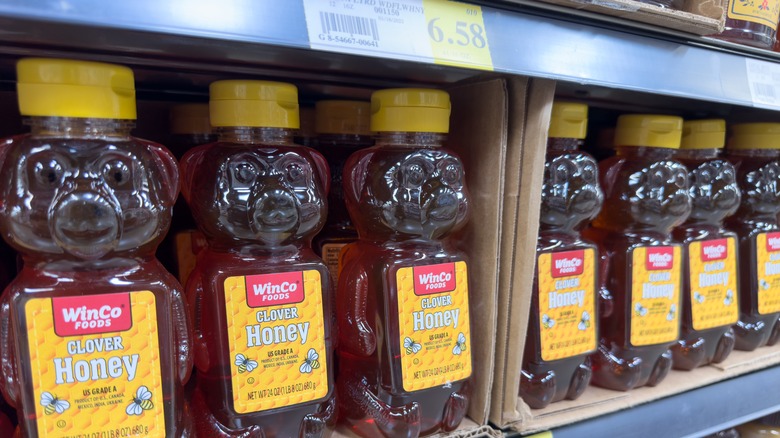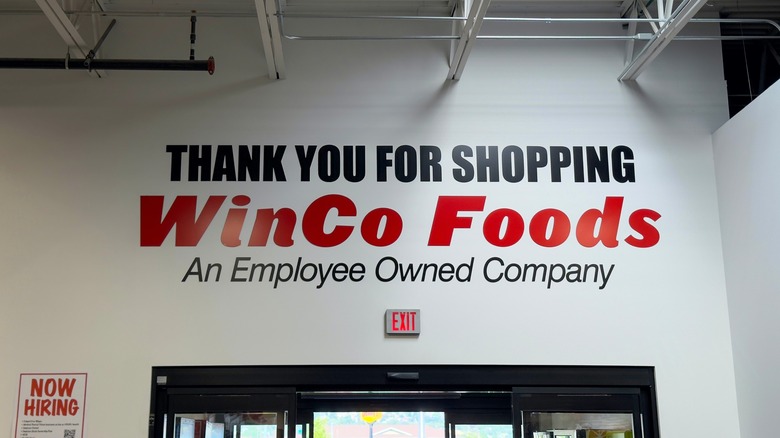The Affordable Big Box Store Rivaling Costco And Sam's Club
As food prices continue to jump — the USDA Economic Research Service (ERS) projects that food prices will rise another 3.5% in 2025 on top of the ERS report that food prices already increased 24.6% between 2020 and 2024 — more and more families might be considering adjusting their grocery store shopping behaviors. With discount grocery retailers like Aldi, and even Costco, offering up more affordable prices for families, a change in the typical grocery store lineup could be a money-saving grocery shopping tactic that families consider taking advantage of. If the idea of changing where, exactly, you shop sounds like a headache, it's important to realize just how significant the cost savings can be.
While it's hard to argue with the price comparisons of much-loved Costco compared to say, Walmart, there is another big box warehouse store that could similarly save your wallet — without the membership fee requirement. While potentially less well known than Costco, or even Sam' Club, WinCo Foods has earned a loyal following since its founding in 1967. With that said, it is worth mentioning that, as of April 2025, WinCo only operates in 10 states: Arizona, California, Idaho, Montano, Oklahoma, Nevada, Oregon, Texas, Utah, and Washington. The company boasts 142 warehouse locations across 124 cities in those states. If you're lucky enough to live close to a WinCo location, their competitive pricing on grocery essentials could make a visit financially worth it.
Understanding WinCo pricing
If you're wondering how WinCo is able to price itself competitively against Costco and Sam's Club, the answer has to do with the company's supply chain. Namely, the company skips middlemen (and their resulting fees) by buying goods directly from manufacturers and farmers. Another factor unique to WinCo is the brand's reliance on bulk bins in its stores. This allows the company to save money on packaging while offering customers the customization options of over 800 items sold by the pound. Similarly, the brand forces consumers to bag their own groceries during the check-out process which helps keep labor prices down. Plus, while more businesses charge customers to use credit cards – in order to offset the resulting fees from card processors — WinCo only accepts debit cards to ensure those baked in credit card processing fees won't ever impact their prices. WinCo also prioritizes high turnover with many of its offered items, meaning that products sell quickly and in high amounts which similarly allows them to keep prices low.
WinCo also avoids any and all advertising –- in fact it's a point of pride for the company -– allowing the company to save money which it then passes on to consumers in the form of lower prices. With that in mind, for those lamenting not receiving the kinds of printed coupons other grocery stores might mail out, WinCo does provide specials in the form of digital coupons which can be redeemed by entering your registered phone number at check out.
Understanding employee ownership
Another feature of WinCo that separates it from competitors has to do with its employee-ownership model. While you might have seen the phrase "employee-owned" on a business in the past, you might not have known exactly what that entailed. For starters, employee-owned companies offer a program generally known as an Employee Stock Ownership Plan ("ESOP"). The ESOP program allows WinCo employees that work at least 500 hours in their first six months of employment, and accumulate 1,000 hours each fiscal year, to essentially become partial owners of the company through stocks. To make the deal even sweeter, WinCo annually contributes 20% of an eligible employee's compensation to their plan in stock.
There are many benefits to employee-owned business models but perhaps one of the best is that the business is ultimately owned, in part, by the exact local community that each location is serving. This not only increases important local representation, but can also allow employees to directly financially benefit from the success of the work they do. This can have the added effect of incentivizing better work product and performance from employees which, in turn, leads to happier customers. While this can help consumers in-person through cleaner stores and better customer service, it can also serve as a haven for those following the growing trend of conscious or ethical consumerism. As consumers grow more conscientious of how their spending can affect both the environmental and economic greater good, supporting a company like WinCo, which treats its employees with respect, can be especially important.


